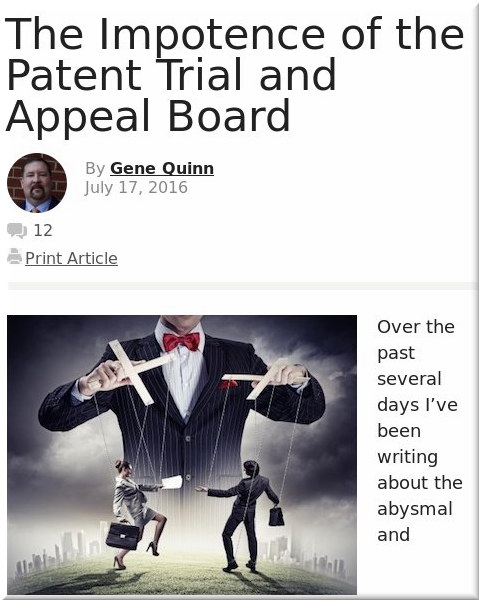

Who hates PTAB? Who hates IPRs? Sites such as Watchtroll and IAM, which are the megaphone of patent trolls, patent maximalists, patent prosecutors and so on. Not actual developers... these sites are the equivalent of pro-UPC sites in Europe (always connected to legal firms looking to exploit the UPC to foster more litigation, injunctions, and damages).
Bloomberg BNA and AIPLA just released a nationwide survey of patent attorneys and agents asking about their experiences with inter partes review at the Patent Trial and Appeals Board. Bloomberg BNA and AIPLA did a survey of attitudes towards inter partes review (IPR). Among attorneys representing patent owners, 48% said that they thought that over all, inter partes review has been very beneficial. This includes in-house counsel. 45% of in-house counsel whose patents had been subject to IPR said that IPRs are very beneficial.
Personally, I find that result pleasantly surprising. I would have expected the numbers to be much lower.
I do note that the survey’s finding is actually a little stronger than Bloomberg reports. The attorneys were asked to rank from 1 to 10 to describe how beneficial they feel that IPRs have been, with 10 being the most beneficial, 1 being the least. 48% of respondents who most recently represented patent owners in an IPR gave a rank between 7 and 10. But if you add in the respondents who ranked it as a 6 (which is still more beneficial than harmful), you get 65% of attorneys representing patent owners. If you only look at in-house counsel in that group, it’s 70% who ranked IPRs as 6 or better.
That is, in a survey of patent attorneys with recent experience with IPRs, a solid majority of attorneys representing patent owners said that they think IPRs are more beneficial than harmful.
Is the survey biased? Bloomberg has no agenda, it’s a news organization. And AIPLA is hardly biased against patent owners. I don’t think it’s fair to impute a bias to either organization.
As of 1st November 2016, the European Patent Office (EPO) Examination Directive that includes the acceptance conditions for recording an assignment underwent changes significantly altering the recordal procedure of an assignment at the EPO.
These amendments, which are in line with an increased formalization, primarily concern the obligation that the assignment contract is to be signed by all parties, and the introduction of a control of the signatories function.